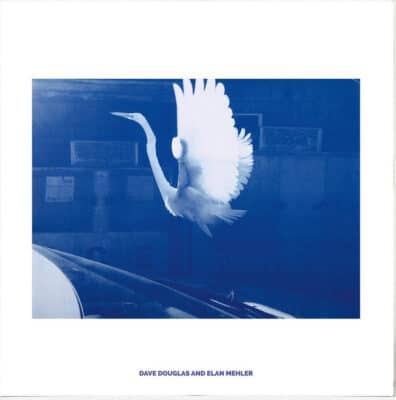Dave Douglas & Elan Mehler If There Are Mountains
Dave Douglas & Elan Mehler
If There Are Mountains
Newvelle Records
Ostensibly this is an album review, but it is also vehicle to inform you about the special treasure, Newvelle Records. So, we’ll keep you in a bit of suspense by describing the album first. Label co-founder Elan Mehler is also a pianist, who for this session, If There Are Mountains, coaxed renowned trumpeter Dave Douglas to not only join him but to help him compose songs for a full band, inspired by, and set to words of, short poems by Basho, Saigyo, Santoka and contemporary poet/songwriter Adam McBride-Smith. That full band, a sextet, has John Gunther on reeds, Simón Willson on bass, and Dayeon Seok on drums, complemented by the clear sounding, extraordinarily articulate vocalist Dominque Eade.
One of the reasons Mehler recruited Douglas aside from being one of today’s top trumpeters, is that Douglas had set some haikus to music in the early 2000s and he and Mehler had covered one of those songs at a gig in Denver. It is presented here, “Village of No Bells” with remarkable muted playing from Douglas with Gunther countering before Mehler’s chords introduce Eade’s vocal.
Since Mehler has provided detailed liners, as he does for all releases, we will liberally excerpt. Vocalist Dominique Eade had worked with Douglas before, is a legend around Boston for the last two decades, cemented in par by her work with pianist Ran Blake. A similar blend is heard on the opening title track, also composed by Douglas with translated words from Japanese poet Santoka Taneda. Gunther plays counter on a robust sounding clarinet. Unlike many composers in improvised music, Douglas keeps it relatively simple and precise, leaving the departure points clear for the musicians. “We Saw You Off” has the musicians playing freely after Eade’s vocal, with Douglas again having a commanding presence with his stellar, full-bodied tone, and free approach, which Gunther picks up on in his own sax solo. Douglas also put to music “With Your Singing,” a showcase for Eade’s amazing vocal range, singing against spare accompaniment before Douglas enters with his signature sound as Mehler comps, Willson steps forward, and Seok gently prods Eade’s next passage before she and Mehler finish quietly, her last note sustained and suspended like a gorgeous echo.
Mehler takes the lead on his composition of the haiku “Even a Nameless Stream” before Gunther plays beautifully on soprano sax. Mehler also wrote the music for “The Spring Current” and for the two longer poems from Adam-McBride-Smith – “Wolf Orchard” and “Here on the Plains,” the former featuring some terrific muted trumpet and the latter wordless vocals in conversation with Gunther’s reed, before Mehler’s pensive playing sets the stage for Eade’s entry, singing the most lyrics of any one tune, as Douglas and Mehler echo support with Gunther’s clarinet again on counter. The rhythm section is subtly effective. And, it wouldn’t be appropriate to at least provide some of the poetry, this being the last stanza from “Here on the Plains” – “Here on the plains we wake/To find the air grown salty/Our talk saltier still/Interlaced with courtly pleasantries/And perilous dipthongs from old world tongues/Our hands would almost/Mistake the plow handle for keel/ And we go sailing off/
Into the endless waves of grass”
This is a serious, concentrated listen with pristine audio that reveals exceptional beauty from all players and demands repeat listens to appreciate all the fine, sensitive nuances at work; an oasis of peace in our turmoil filled world.
- Jim Hynes
Discover more from Making A Scene!
Subscribe to get the latest posts sent to your email.














































